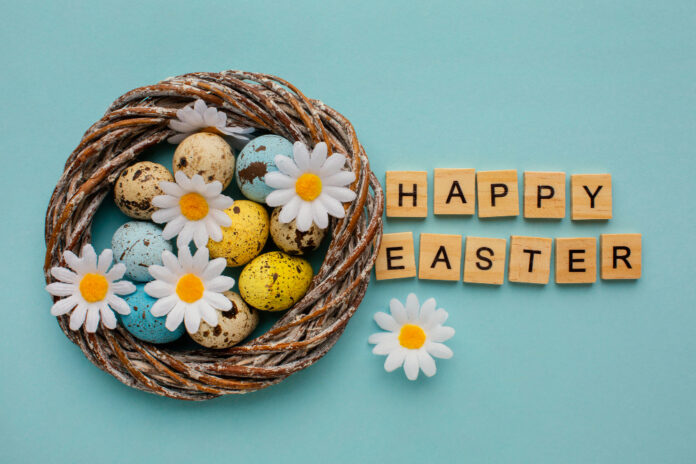Easter 2024
Easter is a significant Christian festival celebrated worldwide to commemorate the resurrection of Jesus Christ from the dead. It marks the culmination of the Holy Week, which begins with Palm Sunday and includes Maundy Thursday (Last Supper) and Good Friday (crucifixion). Easter falls on different dates each year, depending on the lunar calendar. In 2024, Easter Sunday will be celebrated on April 14th.
Also Read: Good Friday 2024: Date, History, Significance
Easter History
The history of Easter dates back to ancient times and is rooted in both Christian and pre-Christian traditions. The festival’s origins are intertwined with the Jewish holiday of Passover and the pagan celebrations of spring.
Pre-Christian Origins
- Spring Celebrations: Many ancient cultures celebrated the arrival of spring as a time of renewal, fertility, and the awakening of life after the winter months. These celebrations often included rituals and festivals honoring fertility goddesses and gods.
- Goddess Eostre: The name “Easter” is believed to have derived from Eostre, the Anglo-Saxon goddess of spring and fertility. Her festival was celebrated around the vernal equinox, which falls in March or April.
- Symbolism of Eggs and Rabbits: Eggs and rabbits were symbols of fertility and new life in many ancient cultures. They were incorporated into spring festivals and eventually became associated with Easter.
Christian Adaptation
- Resurrection of Jesus: Early Christians adapted existing spring festivals to celebrate the resurrection of Jesus Christ. The timing of Easter was set to coincide with Passover, which commemorates the Israelites’ liberation from slavery in Egypt.
- Council of Nicaea: The Council of Nicaea in 325 AD established that Easter would be celebrated on the first Sunday following the full moon after the vernal equinox, ensuring that it would always fall between March 22nd and April 25th.
- Easter as a Christian Festival: Over time, Easter became a central festival in the Christian calendar, symbolizing the victory of Jesus over sin and death and the promise of eternal life for believers.
Modern Easter Traditions
- Easter Eggs: The tradition of decorating eggs is believed to have originated in ancient Mesopotamia and Egypt. Christians adopted the practice, with the egg symbolizing the empty tomb of Jesus.
- Easter Bunny: The Easter Bunny is a more recent addition to Easter folklore, originating in Germany in the 17th century. It was brought to America by German immigrants and became a popular symbol of Easter, representing the arrival of spring and new life.
Easter is a blend of ancient traditions and Christian beliefs, symbolizing new life, renewal, and the hope of salvation. It is a time of joy and celebration for Christians around the world, marking the most significant event in the Christian faith—the resurrection of Jesus Christ.
Easter 2024 Date
In 2024 Easter is celebrated on March 31st Sunday.
Easter Meaning
- Resurrection: Easter symbolizes the resurrection of Jesus Christ from the dead, signifying victory over sin and death.
- New Life: The festival represents new beginnings and the promise of eternal life for believers.
- Renewal: Easter is a time for spiritual renewal and reflection, encouraging Christians to renew their faith and commitment to Christ.
Easter Celebration
- Religious Observances: Christians attend church services, including Easter Vigil, which often begins on Holy Saturday evening and culminates in the Easter Sunday celebration.
- Easter Eggs: Eggs are a symbol of new life and fertility, representing the empty tomb of Jesus. They are often dyed and decorated as part of Easter traditions.
- Easter Bunny: The Easter Bunny is a popular symbol of Easter, bringing eggs and gifts to children. It symbolizes new life and the arrival of spring.
- Easter Feast: Families often gather for a special Easter meal, which may include traditional dishes like lamb, ham, and hot cross buns.
- Easter Parades: Some communities hold Easter parades, featuring festive floats, music, and participants in Easter-themed costumes.
- Easter Egg Hunt: Children participate in Easter egg hunts, searching for hidden eggs in gardens or parks.
Easter is a time of joy and celebration for Christians around the world. It is a time to remember Jesus Christ’s sacrifice and rejoice in the hope of eternal life that His resurrection brings.
FAQs
How is Easter determined?
Easter is determined based on the lunar calendar. It is celebrated on the first Sunday following the full moon after the vernal equinox. This means that Easter can fall anywhere between March 22nd and April 25th, depending on the lunar cycle.
When is Easter?
Easter falls on different dates each year, typically between March and April. It is celebrated on the first Sunday after the full moon following the vernal equinox.
What day is Easter?
Easter is always celebrated on a Sunday. It is the culmination of the Holy Week, which begins with Palm Sunday and includes Maundy Thursday and Good Friday.
The original meaning of Easter?
The original meaning of Easter is rooted in Christian tradition, symbolizing the resurrection of Jesus Christ and the promise of eternal life for believers. However, the festival’s origins also have pagan roots, celebrating spring and fertility.
Easter Sunday meaning?
Easter Sunday commemorates the resurrection of Jesus Christ from the dead, as described in the New Testament of the Bible. It is the most important event in the Christian faith, symbolizing victory over sin and death.
Easter Monday meaning?
Easter Monday is the day after Easter Sunday. It is a public holiday in many countries and is observed as a day of rest. In some traditions, it is also a day for various Easter-related activities and games.





